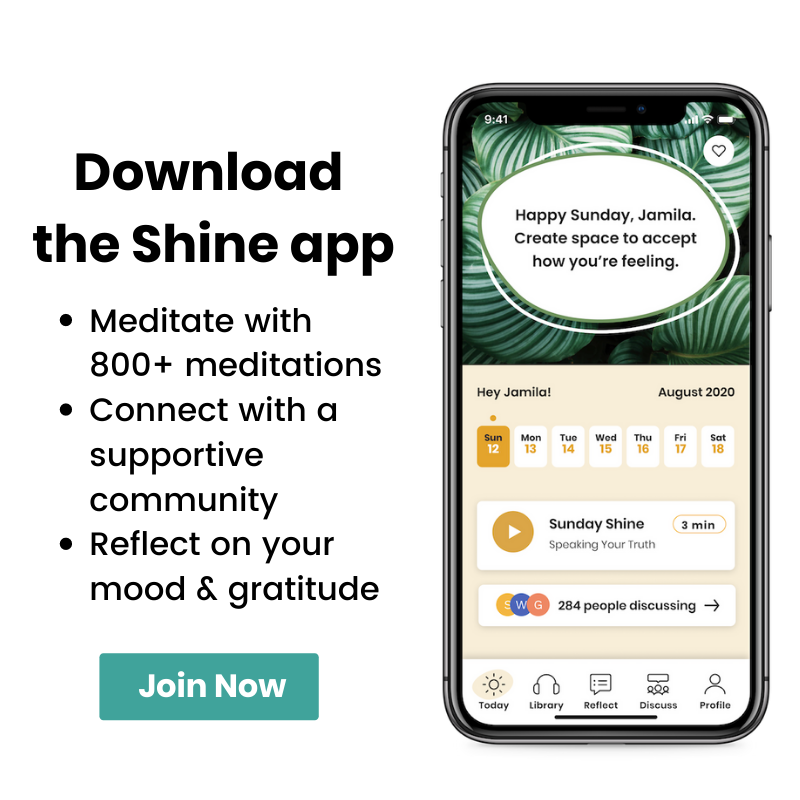Hit A Pandemic Wall? Here's Advice From a Therapist On How To Cope
It's been a whirlwind of a time for new phrases.
In 2020, "social distancing" creeped into our lexicon—and today, "pandemic wall" is a new go-to phrase for folks looking to explain the fatigue that's set in after a year of navigating COVID-19.
Coined in a now-viral tweet by WNYC radio host Tanzina Vega, “pandemic wall” encompasses the exacerbated depression, anxiety, grief, fatigue, and utter exhaustion directly related to the toll of this pandemic.
“Lots of people - including me - are hitting what I’m calling the pandemic wall this week,” Tanzina wrote. “The burnout from working non stop, no break from news, childcare and isolation is hard.”
While it may not be a medical term yet, the struggle of navigating this time is showing up in data. A new study shows that 1 in 3 adults are anxious or depressed due to COVID-19. And for young adults, the numbers are even more jarring, with the prevlance of anxiety three times as high in 2020 than in 2019 and depression four times as high.
Additionally, countless research has also highlighted the disproportionate impact COVID-19 has had on communities of color, communities which already receive an unequal share of mental health care.
To learn more about the "pandemic wall" and how to manage it, we spoke with Dr. Krystal M. Lewis, a clinical psychologist who works at the National Institute of Mental Health. Dr. Lewis, who specializes in cognitive behavior therapy and exposure therapy, breaks down the signs of hitting a "pandemic wall," how to continue to manage and prevent burnout, and so much more.
What are you noticing in regards to this "pandemic wall" many people are hitting right now?
Many people have been doing their best to manage the stress and anxiety for a long while. People are tired of being at home and unable to socialize, travel, and live more balanced lives. Adults and kids alike may have similar feelings of just being “over it.” For many, the new year brought some hope and optimism. Two months into 2021, however, people may find themselves back in the old cycle and they’re feeling drained.
In clinical practice, we’re seeing increases in anxiety and mood-related symptoms. Parents report that they’re noticing more behavioral challenges with their children and they’re noticing that their kids have lower frustration tolerance. Teens are reporting lack of motivation and depressive symptoms. Parents are also exhausted because of continued pressure from work and increased responsibilities related to managing their kids, from schoolwork completion to daily living.
Many adults are also concerned about the health and wellness of their own parents and family members. There is significant stress and worry about what the future holds. We know that this is taking a toll on many elderly people, as well.
Everyone is desperate for a change, whether it’s a change in scenery, a change in schedule, or just a change in the restrictions that have impacted normal activities.
The “pandemic wall” may pop up at different times for people and it often happens more than once. There are often many emotions involved, including fear, anxiety, stress, sadness, and frustration.
It’s almost like running a marathon with no end in sight.
How do we know how much energy to expend at each point and how often we should be taking breaks? For many people, it may feel like complete overstimulation with so much to manage and be mindful of—with so much going on, they may be getting closer and closer to that “wall.”
"The “pandemic wall” may pop up at different times for people and it often happens more than once. There are often many emotions involved, including fear, anxiety, stress, sadness, and frustration. It’s almost like running a marathon with no end in sight." —Dr. Krystal Lewis
What are signs that might indicate you've hit the "pandemic wall"?
You may feel a sense of exhaustion—emotional, physical, and spiritual exhaustion.The most basic tasks start to feel daunting and overwhelming. Motivation to do anything is low. You might feel a range of emotions, but there is a general sense of feeling exhausted. It simply feels like you don’t have enough energy in reserve to keep going.
You may notice increased anxiety or sadness. You may feel tired all the time, a general sense of fatigue that doesn’t go away even after you are well rested. Or you may have trouble sleeping, which then increases your exhaustion, and it becomes a cycle.
As a result, you may experience mental fogginess and decreased productivity. You may lose interest in your normal activities and feel more irritable.
The signs may look a little different for each person, but it’s important that you don’t ignore them. These signs are a cue for you to take care of your mind and body and get help if you need it.
"The signs that you've hit the pandemic wall may look a little different for each person, but it’s important that you don’t ignore them. These signs are a cue for you to take care of your mind and body and get help if you need it." —Dr. Krystal Lewis
Is there anything people can do to prevent further burnout or stress caused by the pandemic as we continue to push through?
Burnout is very common. Many people are balancing so many different responsibilities during this time. For some, there may not be a clear-cut distinction between work and home since it’s all being done from one space. As a result, people may feel that they’re working all the time with no release, which leads to feelings of being overwhelmed and burned out.
To prevent this from happening, it’s most important to schedule breaks and take time off. We need this more than ever given the stress of living through a pandemic. Take time to unwind and relax and do things that you enjoy. Allow your children to take a day off from school and maybe schedule a “family-care” day. Bundle up and go for a hike or just take a walk around the neighborhood. Take a blanket outside at night and do some stargazing from the backyard or on the deck. Fresh air and nature work wonders for the mind and body. Take a day and just lie on the couch watching television, if that is what you choose to do to re-energize.
Know your limitations when it comes to how much work you can do. Be OK with saying no or asking for help. Far too often we take on more than we can handle out of fear that we’re letting people down, that people will perceive us as incompetent, or because we haven’t learned to delegate and let others help out. Ignoring, hiding, or pushing through that stress can sometimes lead to conflict and make you feel worse.
Maintain a positive yet realistic mindset. We know that the pandemic isn’t going to end tomorrow, but we can remain hopeful that things will continue to get better. Focus on the small things that are enjoyable and that you appreciate. Figure out ways to help others who aren’t as fortunate as you. Focus on the news that increases optimism about the future.
Focus on your overall wellbeing. Make sure you have a balanced diet and are active. There are so many ways to be active—you can find an online workout to try, put some music on and dance the night away, engage in some yoga exercises, or play with your kids. There are many things that you can do to move your body and stay fit.
What are new ways people can care for themselves, especially if they feel they've exhausted their usual routines or self-care rituals?
At this point, many people feel as though they’ve tried everything to try to manage the stress from this pandemic. I do think acceptance is imperative. We will all have good days and not-so-great days. Acknowledge the ebb and flow of all emotions and accept that there is no wrong or right way to feel.
If you are sad and tired of being isolated and anxious about getting sick, that is perfectly OK. However, when the feelings linger and make it hard for you to do what you want and need to do, it is important to understand that there are things you can do to boost your mood and deal with current stress:
Cultivate gratitude: Find small things each day to be grateful about. What are some small things that you are thankful for?
Be kind and compassionate with yourself and those around you: Understand that you may not be able to get everything done on your to-do list and that’s OK. Recognize that just as you may be having a tough morning, the same things can happen to your partner or your child.
Start something new: Awaken your imagination and creativity by engaging in new activities or developing new hobbies.
Focus on what you can control: There are different things that we have control over, such as what we’re going to eat, our schedules, what to watch on TV, how we’re going to plan the weekend, etc. It’s important to exercise control over our actions to create change, especially during times when it seems like there is so much that is out of our control.
Ultimately, you may just have to focus on putting one foot in front of the other to keep moving, no matter how slow the pace. And, most importantly, ask for help when you need it and seek professional help if you need support for your mental health.
Note: If you are in crisis and need help, please seek support from a medical professional. Here are some resources from the National Institute of Mental Health to help you get started:
Disaster Distress Hotline: This helpline, sponsored by the Substance Abuse and Mental Health Services Administration (SAMHSA), provides immediate counseling for people experiencing emotional distress related to any disaster or tragedy, including the coronavirus pandemic. Call 1-800-985-5990 to connect with a trained professional from the closest crisis counseling center within the network.
National Suicide Prevention Lifeline: The Lifeline provides 24-hour, toll-free, and confidential support to anyone in suicidal crisis or emotional distress. Call 1-800-273-TALK (8255) to connect with a skilled, trained counselor at a crisis center in your area. Support is available in English and Spanish and via live chat.
Read Next: We Asked Experts How to Cope With Your Coronavirus Anxiety)

Shine is supported by members like you. When you buy through links on our site, we may earn an affiliate commission. See our affiliate disclosure for more info.



